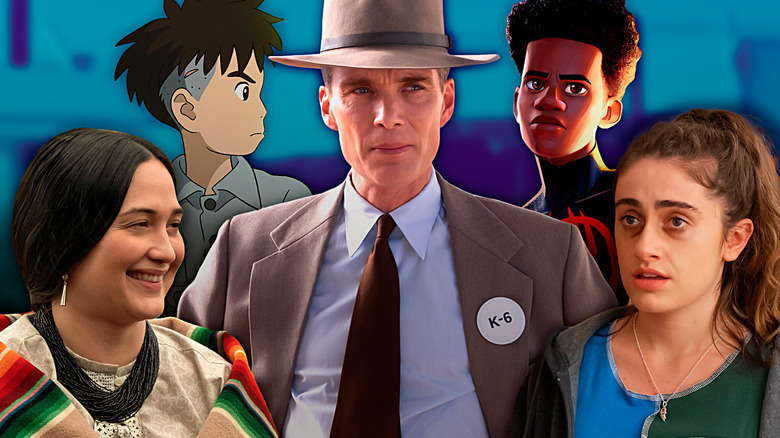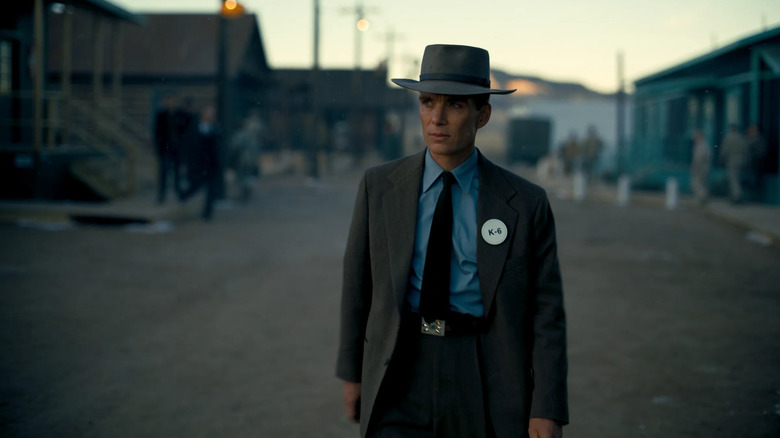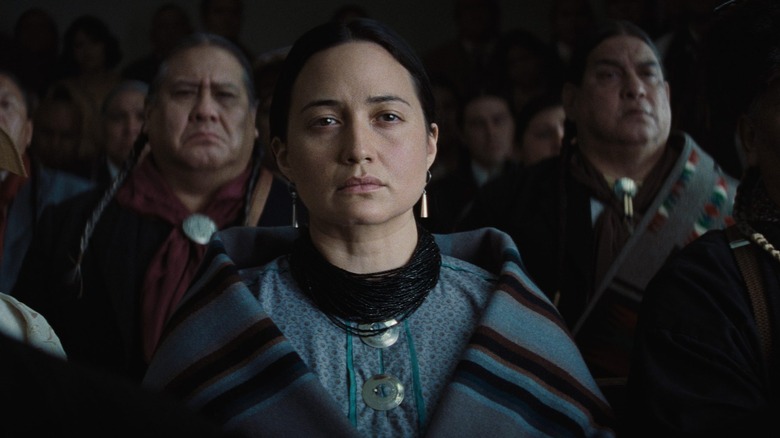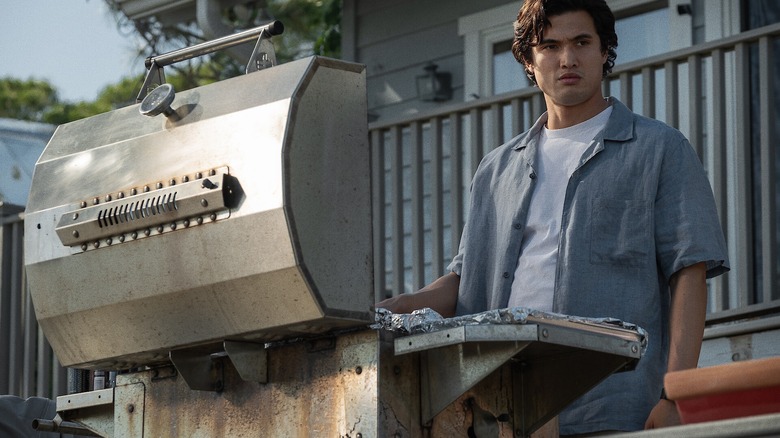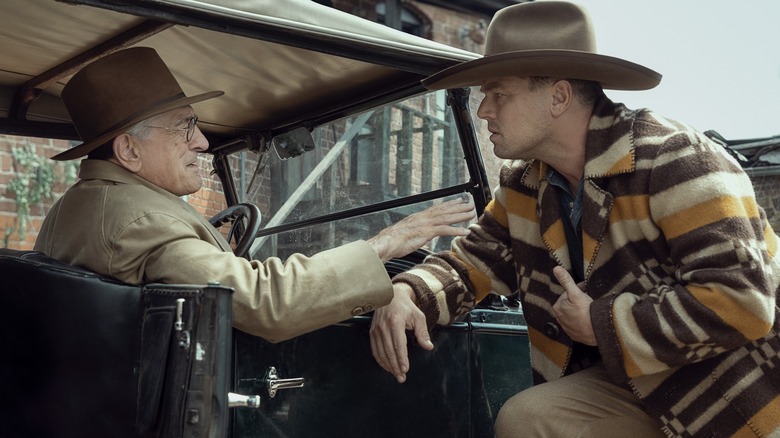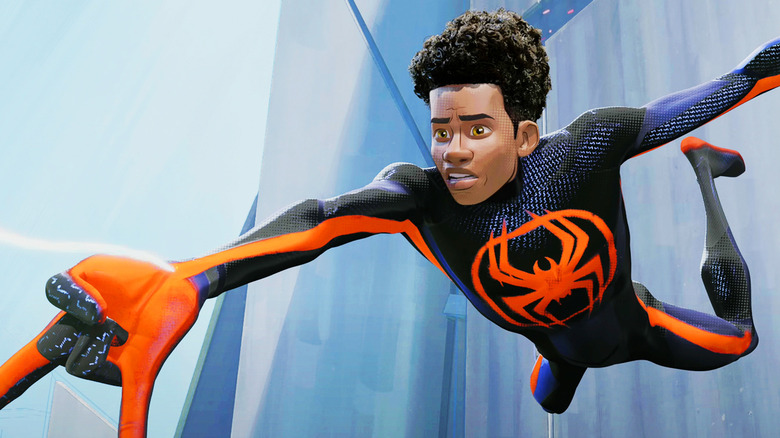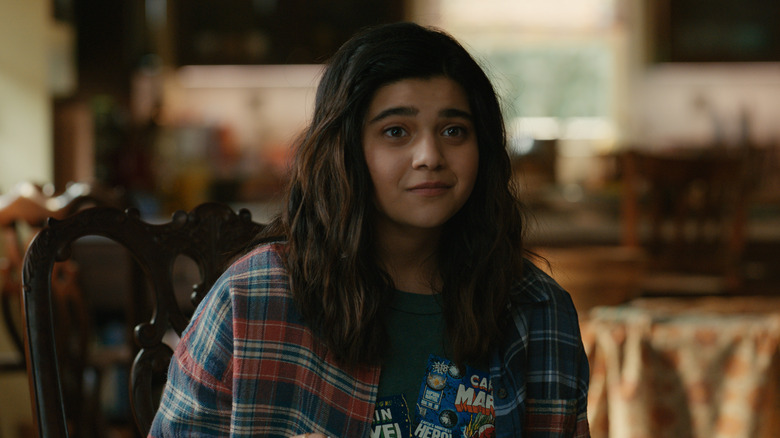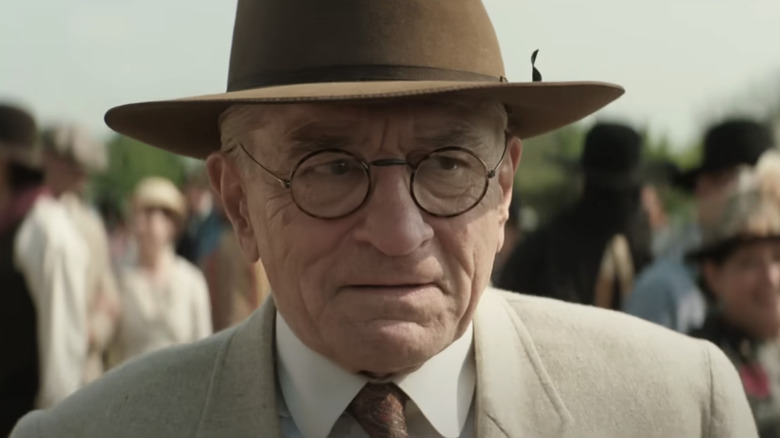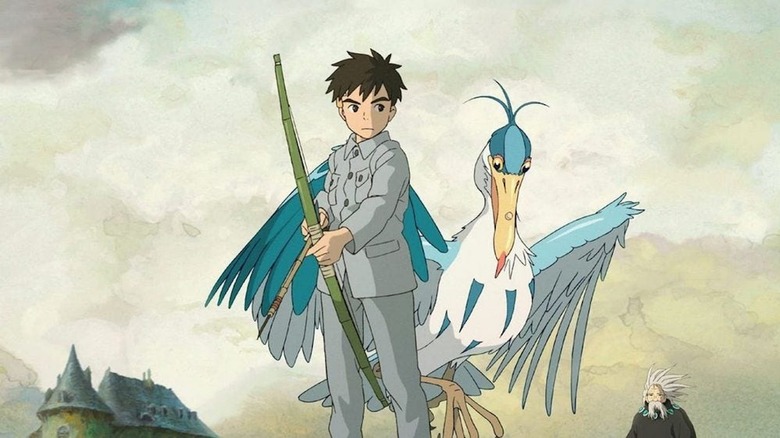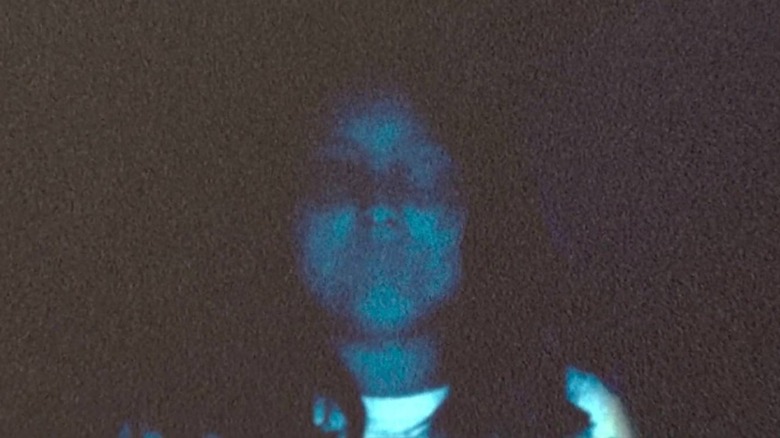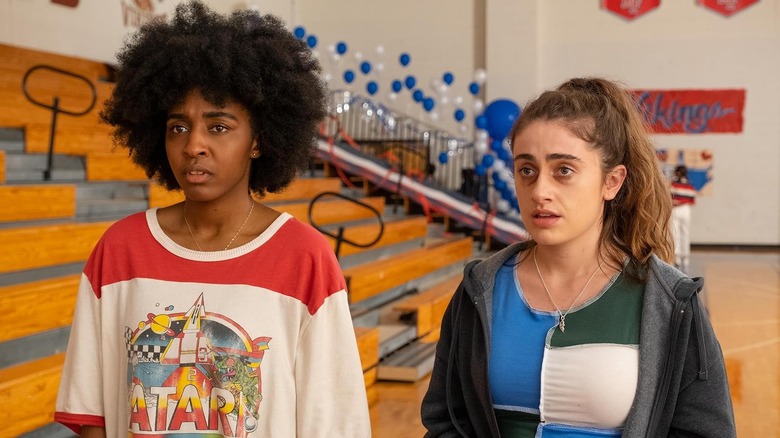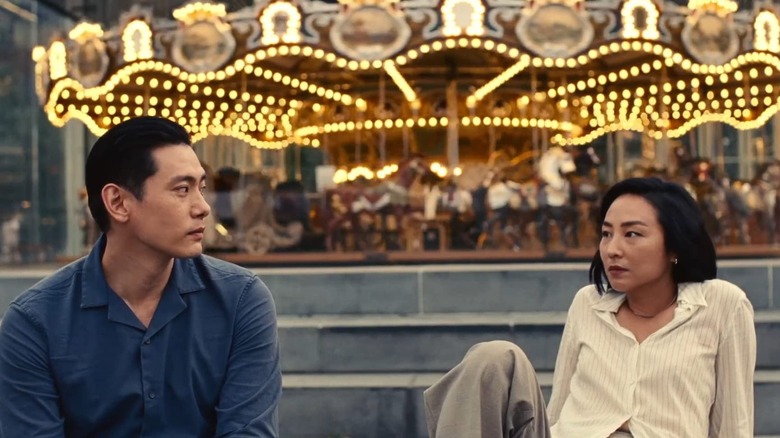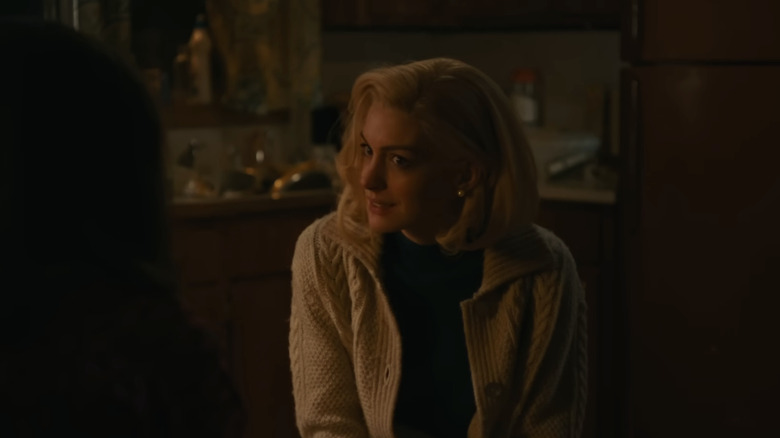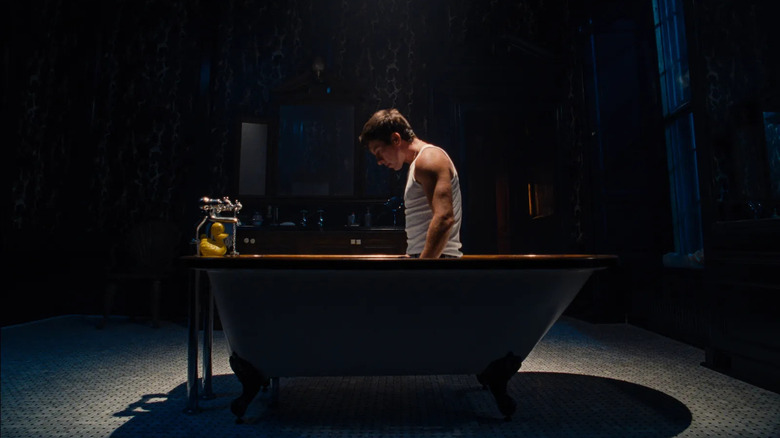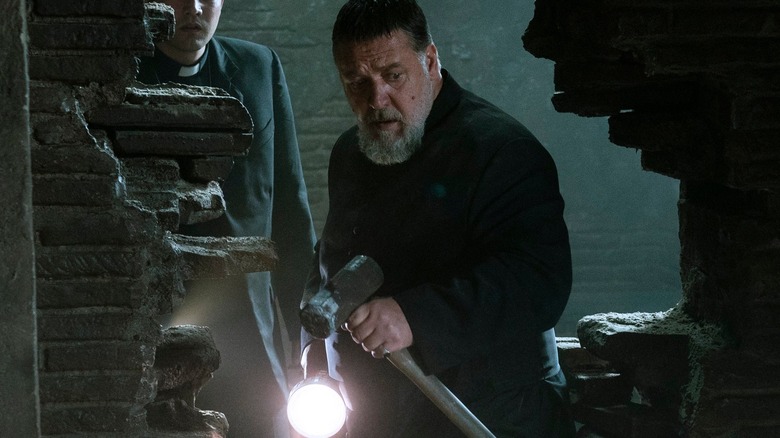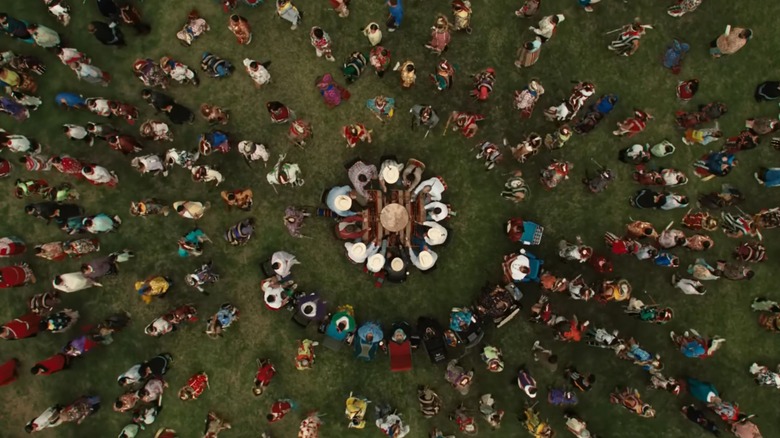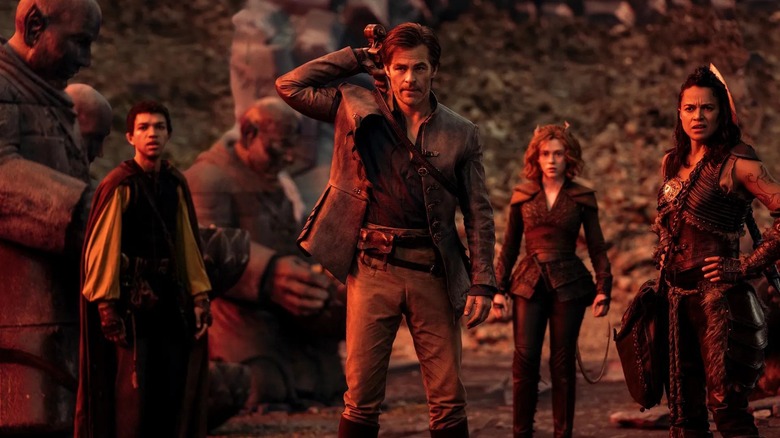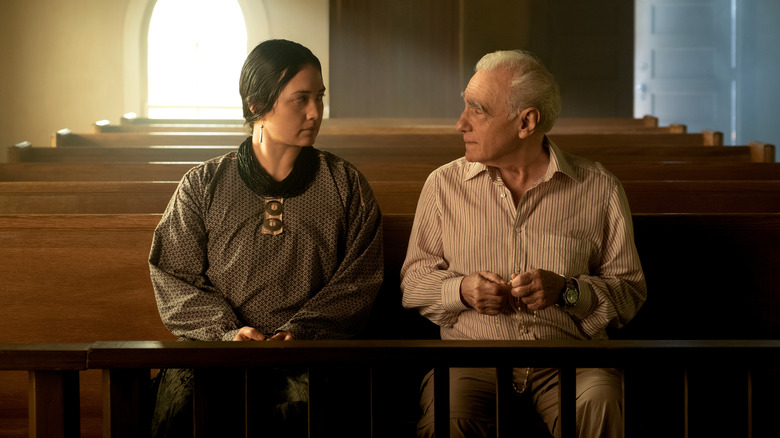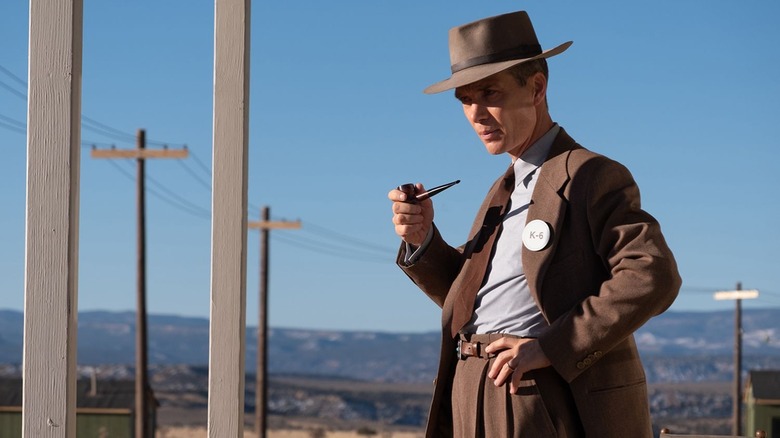The 2023 /Film Movie Awards: The Best Movies, Performances, Characters, And More
Forget the Academy Awards. The /Film Movie Awards are here to pick the real winners in cinema from 2023.
As we wind down a tremendous year for good movies (even if it was shaky one for the larger film industry in terms of box office and a very necessary strike or two), the editorial and writing teams at /Film decided it was time to hand out our own golden statuettes. Even if they're purely of the metaphorical variety. We brainstormed the categories. We debated the nominees. We cast the final votes in some agonizingly close showdowns ... and a few total blowouts. The result is a list of winners that runs the gamut from major blockbusters everyone saw to tiny independent films that need some cheerleading. Animation made a strong showing outside of the expected categories, a few "disappointments" proudly kicked through the noise to win a few categories, and we even overwhelmingly selected one figure to achieve our first "Movie Person of the Year" award.
So cast away your Oscar ballots. Burn the Golden Globes to the ground. Let's go.
Best Movie: Oppenheimer
I'm a Christopher Nolan fan, but I'll admit it: I was worried "Oppenheimer" might be a stuffy period piece, the type I could only admire and not love. I was utterly wrong. This year, it was the only film I went back to the theaters to watch again, and my hunger to experience it again has not abated even after both an IMAX and then 35mm screening. It's the most entertaining and towering film I've seen this year. No director these days does spectacle as well as Nolan does, and that skill is how he makes a talky, character-driven drama that's edited like a collage into a propulsive force. While Oppenheimer's creation made a worse world, Nolan's film charts a better path for movies.
"Oppenheimer" owes a debt to Oliver Stone's "JFK," with its recognize-every-face cast, three-hour length, and kaleidoscopic editing, and it pays that debt back in worthiness. Whether the scene is the Trinity nuclear test or a simple security hearing, Nolan keeps the suspense coiled, inducing the audience with the same anxiousness as the characters even though the outcome is foregone.
The film would be incomplete without career-best work from Cillian Murphy and Robert Downey Jr. The former especially, since even as Oppenheimer changes the world, we live in his head, with Ludwig Van Goransson's droning score an aural simulacrum of his thoughts. The film's devastating finale lets him and the audience contemplate how evil can be accomplished when you keep the consequences theoretical. (Devin Meenan)
Runners-Up: "Godzilla Minus One," "Killers of the Flower Moon," "May December," "Past Lives"
Best Leading Performance: Lily Gladstone, Killers of the Flower Moon
Considering I previously wrote an article about how they're too good to win an Academy Award, it should come as no surprise that our winner for Best Leading Performance is Lily Gladstone in "Killers of the Flower Moon." Gladstone's performance as Mollie Kyle Burkhart is not restrained, but with a precise stillness and intentionality that went unmatched in 2023. In just a single raised eyebrow, a slight smirk, a timed blink, or an adjusted strand of hair, Gladstone held their own on-screen opposite both of Martin Scorsese's favorite men — Leonardo DiCaprio (Ernest Burkhart) and Robert De Niro (William Hale).
"Killers of the Flower Moon" is only as effective as Gladstone allows it to be, and with their talent, it's sensational. Even when Gladstone is not physically present on screen, Mollie Burkhart's presence hangs in the air. As we learn more and more about Hale and Burkhart's horrific plans, it's impossible as a viewer not to sit and wonder where Mollie is, what she's doing, and how she's going to respond. "She is the heart and soul of this movie, she really is," said DiCaprio in a red-carpet interview with Entertainment Tonight. "She embodied that character, she took on the soul of this woman and embraced herself into the Osage community."
And then there are those scenes, the moments when Gladstone lets the agony of the real Mollie Kyle erupt through her body and voice, where their performance becomes transcendent. To be able to deliver such controlled placidity and sonorous wailing, sometimes in an instant, makes her a true marvel. (BJ Colangelo)
Runners-Up: Cillian Murphy, "Oppenheimer;" Paul Giamatti, "The Holdovers;" Emma Stone, "Poor Things;" Greta Lee, "Past Lives"
Best Supporting Performance: Charles Melton, May December
Todd Haynes' "May December" introduces a 36-year-old Joe (Charles Melton) who seems to have the perfect life with a much older Gracie (Julianne Moore), but when the foundation of their life together is unraveled, darker truths are revealed. Joe, who was just a child when he met Gracie, gradually comes to terms with the abuse, manipulation, and horrid power dynamics inherent within this relationship, leaving him shattered and devastated in the process. Melton plays Joe with incredible nuance and restraint, unleashing an unforgettable performance that shines brighter than that of the film's star-studded cast — one that is built on subtle expressions and physicality bound to leave the viewer heartbroken.
Melton achieves the delicate balancing act of portraying Joe as someone forced to assume fatherhood and the maturity that comes with it at such a tender age with the demure awkwardness of a man never able to express himself freely due to years of grooming and abuse. This dichotomy is expressed in the way Joe carries himself, burdened with layers of unprocessed trauma that simmers underneath the surface. When the realization hits, it leaves Joe reeling, as it compels him to come to terms with a brand of loneliness that is too unbearable to parse. Melton's complex, sobering portrayal is one of the most compelling performances of the year. (Debopriyaa Dutta)
Runners-Up: Dave Bautista, "Knock at the Cabin;" Ryan Gosling, "Barbie;" Mark Ruffalo, "Poor Things;" Rachel McAdams, "Are You There God? It's Me, Margaret"
Best Screenplay: Killers of the Flower Moon
Filmmakers are generally expected to improve with age, continually evolving with the times and challenging themselves to step further and further outside of their personal comfort zone. What's unusual, however, is for those with many more movies behind them than remains ahead to release arguably their most incisive effort at the age of 80. That's precisely what Martin Scorsese did with "Killers of the Flower Moon," the crime drama telling the true story of the unimaginably wealthy Osage Nation and the murderous conspiracy to rob them of their oil-rich land, titles, and inheritances in the early 1920s.
Adapted from author David Grann's book of the same name, Scorsese and co-writer Eric Roth basically sealed their Best Screenplay win when they made the inspired choice to focus less on the white perspective of it all — the book emphasizes the investigation into the murders and the origin story of the FBI — and instead foreground the impact such injustices had on the victimized Indigenous population. The script intuitively centers the relationship between Mollie Burkhart (Lily Gladstone) and her white husband Ernest (Leonardo DiCaprio), thus making Ernest and head conspirator William Hale's (Robert De Niro) crimes hit that much harder. And, of course, Scorsese literally getting the final word with his moving cameo in the concluding moments of the film before ceding ground to celebrate the surviving members of the Osage tribe ranks as the most stirring movie ending of the year. At 80 years young, Scorsese's still taking us to school. (Jeremy Mathai)
Runners-Up: "Anatomy of a Fall," "Asteroid City," "May December," "Oppenheimer"
Most Visually Stunning Movie: Spider-Man: Across the Spider-Verse
"Spider-Man: Into the Spider-Verse" raised the bar for both the medium of animation and the quality of superhero storytelling, so a sequel that goes above and beyond to keep impressing audiences feels like a tall order. But "Spider-Man: Across the Spider-Verse" pulls it off, thanks to both the expansion of a central character's place in the story and the introduction of a handful of new Spider-People and their mesmerizing universes, offering some stunning new artistic palettes that are truly unique.
First, the default universe in habited by Miles Morales is already an incredible representation of comic book art, and brings New York City to life in a whole new way. Then, we shift into Gwen Stacy's universe, with constantly changing swirls of water color pastels that shift with Gwen's emotions, where she does battle with a version of Vulture that looks like a sketch by Leonardo da Vinci. As the story expands, we're thrust into the world of Pavitr Prabhakar, the Spider-Man of Mumbattan, India, which bustles even more than NYC, complete with artistic inspiration from both Indian culture and the 1970s artwork of Indrajal Comics. It doesn't end there, because we also meet Spider-Punk, a character comprised of vintage clippings from punk rock flyers and magazines from 1960s era London.
All of that is before we're introduced to the Spider-Society, situated in a futuristic version of New York that is densely populated with pretty much every single version of Spider-Man you've ever heard of, and even more than you haven't. There's even a live-action version of the villain Prowler played by Donald Glover. Each character has their own signature animation style, and every corner of the Spider-Verse was crafted with such meticulous creativity that you can't help but get lost in it like Miles Morales himself. (Ethan Anderton)
Runners-Up: "Asteroid City," "Barbie," "Oppenheimer," "Teenage Mutant Ninja Turtles: Mutant Mayhem"
Best Musical Score: Spider-Man: Across the Spider-Verse
When it comes to a film celebrated for its astonishing visual accomplishments, it's easy to forget the score. But "Spider-Man: Across the Spider-Verse" not only provided some of the most stunning animation moments yet seen in film, it also featured novel and inventive instrumentation that was every bit as mind-blowingly creative as the visuals.
Daniel Pemberton, who returned from 2018's "Spider-Man: Into the Spider-Verse," crafts a score that keeps up with the film's dazzling odyssey through multiple worlds and timelines without missing a step. From the drum hits that open the film, to the intense synth throbs that accompany the taut finale, Pemberton never once loses pace with the impressive scope of "Across the Spider-Verse."
But it's arguably the smaller touches that make Pemberton's score so impressive. For Miles' introduction scene, for example, rather than simply provide a Hip Hop accompaniment, the composer used the talents of DJ Blakey to take real-world sounds and scratch them on vinyl, turning car crashes, spray cans, and even goose honking into a part of the score itself. In that way he blends sound design and instrumentation in a way that feel true to the film's multiversal eclecticism. Add to that the fact that Pemberton essentially created eight different scores for each of the movie's eight main universes, and the accomplishment is undeniable. (Joe Roberts)
Runners-Up: "Barbie," "Bottoms," "The Boy and the Heron," "Oppenheimer"
Best Hero: Kamala Khan, The Marvels
There have been a lot of superheroes on the big screen this year. If you're getting a little tired of it all, I challenge you to watch Iman Vellani as Kamala Khan, aka Ms. Marvel, for five minutes and not fall right back in love with superhero films. You just cannot be immune to her enthusiasm about how cool it is to have superpowers.
Kamala reminds us of that time in our childhoods when a dish towel was a cape (sorry Edna) and we fought the bad guys on the playground. Even in a film as lackluster as "The Marvels" (and I wanted to love it so much), Vellani is a ray of happiness. She melts the hearts of Nick Fury (Samuel L. Jackson), Monica Rambeau (Teyonah Parris), and Carol Danvers (Brie Larson) the same way she melts ours.
It's not just that she's excited about her powers, or that she gets to meet her hero Carol. It's her love for being a superhero and unwillingness to let you continue to be cynical. It actually works. Another actor in this role might make you feel like you'd had sugary syrup poured all over you, but Vellani invites you into this world she loves in a way that makes audiences want to reexamine why they were fans in the first place. Iman Vellani is the Marvel Cinematic Universe's secret weapon. She is an absolute ball of sunshine that you cannot help but let warm you. (Jenna Busch)
Runners-Up: Barbie, "Barbie;" Egdin, "Dungeons & Dragons: Honor Among Thieves;" John Wick, "John Wick: Chapter 4;" Lucy Gray Baird, "The Hunger Games: The Ballad of Songbirds and Snakes"
Best Villain: William Hale, Killers of the Flower Moon
In 1963, philosopher Hannah Arendt published her study of former Nazi Adolph Eichmann entitled "Eichmann in Jerusalem: A Report on the Banality of Evil," coining a phrase with her subtitle that best summed up Eichmann's disturbingly dispassionate attitude toward the atrocities he'd helped enact. Later, in 1971, she further elaborated on her observation of the man, writing that "The deeds were monstrous, but the doer [...] was quite ordinary, commonplace, and neither demonic nor monstrous."
That description perfectly sums up the character of William King Hale, as portrayed by Robert De Niro in Martin Scorsese's "Killers of the Flower Moon." Based on the real-life crime boss who operated in Osage County, Oklahoma during the early decades of the 20th century, Hale was (as in the film) instrumental in systematically stealing the oil-rich land from the Osage Nation people, playing out a scheme that included strategic marriages of white men to Osage women as well as outright murder.
De Niro is no stranger to portraying villainy on screen; his prior work with Scorsese alone includes the psychopath Travis Bickle in "Taxi Driver" and the delusional Rupert Pupkin from "The King of Comedy." Yet his portrayal of Hale (helped along, of course, by Scorsese and Eric Roth's screenplay) is disturbingly low-key, the man acting insidiously warm, gregarious, and seemingly oblivious. It's not that Hale doesn't know what he's doing, it's that he seems to have no hint of understanding that it's wrong.
There are numerous instances of villains we love to hate; the disturbing aspect of William Hale is that, out of context, he's genuinely likable. He is every bit the encapsulation of the banality of Evil, and — as the film disturbingly and correctly implies — he's only one of thousands of such men throughout history. (Bill Bria)
Runners-Up: Duncan Wedderburn, "Poor Things;" The Entity, "Skinamarink;" Godzilla, "Godzilla Minus One;" Oliver, "Saltburn"
Best Animated Film: The Boy and the Heron
Hayao Miyazaki's retirement/unretirement cycle began in 1997 after the completion of his masterful "Princess Mononoke," but there was a sense of permanence when he called it quits in 2013 with the release of "The Wind Rises." The biography of aero-engineer Jiro Horikoshi was both a departure and a summation, a grounded-in-reality reverie on the physically/spiritually transporting power of flight. For a filmmaker who'd long had his head in and above the clouds, this felt like farewell.
It wasn't, and thank god for that. With "The Boy and the Heron," the world's greatest living animator has delivered a profoundly moving hand-drawn meditation on how we survive the torments and tragedies of childhood. The film begins with our 12-year-old protagonist Mahito's mother perishing in a Tokyo hospital fire during World War II, then moves to the countryside where his father (a munitions manufacturer like Miyazaki's own father) marries his deceased wife's sister. When Mahito's stepmother disappears, the young man, addled by grief and fury, is prodded by a talking heron to undertake a fantastical quest to find her. It's at this moment that Miyazaki's feverish imagination kicks into overdrive and plunges us into a through-the-looking-glass adventure that's confounding and exhilarating in equal measure. This is the closest Miyazaki has ever come to an animated autobiography, so, once again, it's tempting to view this as a swan song. But this is the work of a vigorous, creatively thriving artist. At 82, Miyazaki remains one of our most vital voices. (Jeremy Smith)
Runners-Up: "Nimona," "Spider-Man: Across the Spider-Verse," "Suzume," "Teenage Mutant Ninja Turtles: Mutant Mayhem"
Best Horror Movie: Skinamarink
Kyle Edward Ball's "Skinamarink" is the closest cinema has come to an actual nightmare since maybe David Lynch's "Eraserhead" in 1977. Shot on a budget of only $150,000 Canadian, "Skinamarink" follows two young children, about four and six, who are up in the middle of the night in their suburban home. Curiously, the doors and windows begin vanishing, leaving blank walls behind. They watch old, public-domain cartoons on a TV in their playroom, and it seems to provide the only light in the house. They speak only in whispers. They sneak into their parents' bedroom, and cannot see their faces. There are whispers. "Look under the bed." "Come upstairs." "Put the knife in your eye ..."
Ball shot "Skinamarink" with an intentional low-fi look and sound, giving the eerie analog hiss of old audio cassettes a life of its own, and hiding unseeable demonic faces in the very texture of the film's grain. There is no story in "Skinamarink," as it were, and no logic. Years seem to pass in that single night. And yet, it may feel terrifyingly familiar to anyone who remembers getting out of bed at night and exploring their own home as if it's a hellish landscape of toys that move on their own, and whispers that cannot be understood.
"Skinamarink" is one of the scariest films of the year, perhaps even of the decade. It casts a spell with its quiet, with its images, with its horrifying devil-like glimpses of hurt children, missing parents, and other ineffable beings who are ... it's definitely there, right? (Witney Seibold)
Runners-Up: "Evil Dead Rise," "M3GAN," "Talk to Me," "When Evil Lurks"
Best Comedy Movie: Bottoms
In a year full of great comedies that delivered blissfully R-rated humor or put a cheerfully queer spin on longstanding genres and institutions, "Bottoms" was the rare film to do both equally well. Writer/director Emma Seligman's movie is the latest addition to the tried and true tradition of high school chuckle-fests about awkward hormonal teenagers desperately trying to get laid. In this case, however, the leads — besties PJ (Rachel Sennott) and Josie (Ayo Edebiri) — are ungainly lesbians conspiring to hook up with their cheerleader crushes by starting a "self-defense club" that's mostly about punching people's lights out in the name of some vague idea of female empowerment. Of course, in doing so, they wind up butting heads with the school's alpha male football players, who are fully accustomed to getting whatever they want whenever they want.
As firmly tongue in cheek as "Bottoms" is in the way it riffs on classic "dorks vs. jocks" tropes, it's also very much sincere when it comes to depicting PJ and Josie's clumsy journey towards embodying the feminist values that they profess to believe in. The same can be said for the film's cast at large (Sennott and Edebiri in particular), all of whom deftly walk the tightrope between satirical and earnest at any given moment. Combine that with the tight runtime, the ecstatically violent comedic fight scenes, and some amusingly cheeky running gags (plus a killer needle drop), and it's fair to declare "Bottoms" an instant Gen Z classic. (Sandy Schaefer)
Runners-Up: "Barbie," "Joy Ride," "No Hard Feelings," "Theater Camp"
Best Romantic Movie: Past Lives
It's amazing what a needle-drop cue can accomplish, even if it's just wafting in the background as seemingly little more than atmosphere. But when Leonard Coen's fatalistic ballad "Hey, That's No Way to Say Goodbye" delicately underscores 12-year-old Na Young's announcing her Western name prior to moving with her family from Seoul to Toronto, you figure a song this indelible is there for a purpose.
Everything is purposeful in Celine Song's "Past Lives." It's a precision-crafted heartbreaker about two young people, separated by thousands of miles, who reconnect as young adults and then again in their thirties as they prepare to settle into the rest of their lives. Greta Lee (Nora) and Teo Yoo (Hae Sung) are transfixing as a couple of restless spirits who connected powerfully as children before circumstances beyond their control drove them apart. Hae Sung is a powerfully committed romantic; Nora's abrupt goodbye has haunted him for over 20 years, and he must find some semblance of closure before he lets go. Nora has moved on, but, citing the Korean-Buddhist concept of In-Yun, believes the two share a connection that spans myriad lifetimes. They could be lovers, but not in this existence. Watching Lee and Yoo walk right up to the brink of a kiss brings to mind David Lean's "Brief Encounter." But it's not about heat. It's about a sense of romantic destiny that resides in some other timeline. In this life, Nora and Hae Sung are destined to be apart, and, god, how that aches. (Jeremy Smith)
Runners-Up: "All of Us Strangers," "Passages," "Rye Lane," "Sanctuary"
Best Movie No One Else Saw: Eileen
There were a lot of truly incredible movies that slipped below the radar this year, undiscovered in favor of big budget blockbuster sequels and controversial arthouse darlings, but none felt as slyly surprising or as under-loved as "Eileen." Directed by "Lady MacBeth" helmer William Oldroyd and based on the novel by Ottessa Moshfegh, "Eileen" is a queer romantic thriller about a strange young woman (Thomasin McKenzie as the titular Eileen) who works as a secretary at a corrections facility in the 1960s and develops a serious crush on her job's new psychologist, Rebecca (Anne Hathaway). Eileen is kind of an oddball, a shut-in with an abusive, alcoholic father, so when Rebecca shows friendship to poor Eileen, the girl latches on for all she's got.
"Eileen" keeps its tension simmering just under the surface until the right moment, and it's a wonderfully taut, brilliantly paced thriller that never overstays its welcome. The one good thing about "Eileen" not getting the praise it deserves is that people aren't out there spoiling it, because this is one movie that truly benefits from going in as blind as humanly possible. The less you know the better, just prepare for an absolutely stellar Hathaway performance. Seriously, in a just world, she would be on everyone's lips as for Best Supporting Actress. (Danielle Ryan)
Runners-Up: "The Artifice Girl," ""BlackBerry," "How to Blow Up a Pipeline," "Reality"
Best WTF Movie: Saltburn
If "The Killing of a Sacred Deer" and "The Green Knight" didn't teach you a lesson about trusting characters played by Barry Keoghan, then "Saltburn" is here to provide a vivid reminder. The second feature film from "Promising Young Woman" director Emerald Fennell" turns its gaze on the strange, cruel, luxurious world of the English aristocracy, through the eyes of Keoghan's quietly scheming outsider Oliver Quick. After gaining the sympathies of the aptly-named favorite son Felix (Jacob Elordi), Oliver sets about seducing every member of the venerable Catton family — whether it's the literal seduction of Felix's sister Venetia (Alison Oliver), or simply pretending to care about the Huguenots in order to impress Sir James Catton (Richard E. Grant).
Oliver wears a lot of masks in "Saltburn," but it's in the moments when he's left alone that his true, twisted self emerges and the film truly earns its "WTF" title. There's the now-infamous bathtub scene, the even-more-infamous grave scene, the triumphant final shot, but also smaller moments — like breaking the mirror in his room, just to see if anyone says anything about it. They don't. The mirror is simply quietly repaired, as if by magic, underlining the surreal fantasy existence of the super-wealthy, and the immortality of Saltburn itself. (Hannah Shaw-Williams)
Runners-Up: "Beau is Afraid," "Dicks: The Musical," "The Outwaters," "Skinamarink"
Best Bad Movie: The Pope's Exorcist
"The Pope's Exorcist" is horror junk food at its finest. Or rather, at its most delicious. There's nothing "fine" to be found in director Julius Avery's ridiculous horror adventure, but it excels at delivering lowest common denominator thrills and chills, while leaning into its most bizarre touches with relish. Some may dismiss this is as "bad" movie, hence its victory in this category. However, "The Pope's Exorcist" is the kind of movie that defies traditional classification, trampling all over the line between good and bad with glee. Is this is a good movie? Probably not. Is it a movie I will watch a half dozen more times, chuckling and grinning like a lunatic each and every single time? Absolutely. This is the perfect modern B-movie.
But the reason this film works, what elevates it from pretty okay B-movie to A-class B-movie, is the presence of Russell Crowe. Looking his age and proudly carrying around a few extra pounds (and looking fantastic), Crowe's demon-hunting priest makes an immediate impression and leaves you wanting to watch him lead a dozen sequels. Utilizing his goofy Italian accent like the acting equivalent of an atomic weapon and puttering around Europe on a scooter while wearing full priest regalia (one of 2023's most delectable cinematic images), Crowe makes a strong case for a late-career resurgence as our weirdest horror movie actor. Bless this perfectly imperfect movie, and its perfect lead performance. (Jacob Hall)
Runners-Up: "Fast X," "The Flash," "Meg 2: The Trench," "Plane"
Best Movie Ending: Killers of the Flower Moon
"Killers of The Flower Moon" has two endings, and both astonish. In the first and most talked-about, director Martin Scorsese casts himself as part of a hackneyed, sensationalistic group of voice actors performing a true crime radio play. It's a self-reflexive and self-deprecating gesture that brings the legendary filmmaker down from his pedestal, reminding viewers that he may be the man behind influential films like "Raging Bull" and "Goodfellas," but he's still a white man telling a story about atrocities committed against Indigenous peoples decades after the fact. He's also doing so via the commercialized medium of film; is he really any better than the jesters beside him, making murderous sound effects for entertainment value? There's a limit to Scorsese's abilities as a storyteller, and he graciously acknowledges it here.
The filmmaker's final in memoriam for Mollie Kyle is reverent, respectful, and painfully sad, but it's also an acknowledgement of every complex ethical tension stitched into this film. The movie's second ending, too often forgotten, is a reclamation of the narrative by the people it's always been about: a birds-eye-view scene of a modern-day Osage powwow, proof that the film's wolves could not kill the culture and lineage of those they so brutally hunted. This sequence is presented without comment, its simplicity a beautiful and bittersweet contrast to its loaded predecessor. "We're here," it seems to say. "We're still here." (Valerie Ettenhofer)
Runners-Up: "Saltburn," "Barbie," "No One Will Save You," "Oppenheimer"
Most Pleasant Surprise: Dungeons & Dragons: Honor Among Thieves
In the lead-up to the release, it was never quite clear which way "Dungeons & Dragons: Honor Among Thieves" was going to go. Yes, the trailers made it clear the approach was fun/funny, and yes, the guys who directed "Game Night" were behind the camera. But was it actually going to be good? One of the most surprising things of the year that was 2023 in cinema is that the movie is not just good — it's f*cking great. Funnier than anyone could have imagined, with great action beats, impressive visual effects, and charmingly true to the spirit of the game it was inspired by. This is the best-case scenario for adapting popular IP in the modern age.
Doing a funny version of a "D&D" movie always ran the risk of seeming like it was making fun of the game, whereas an overly serious version ran the risk of being, well, too serious. John Francis Daley and Jonathan Goldstein manage to find the perfect balance, in no small part thanks to one of the best ensemble casts assembled on screen this year. Chris Pine is at his charming best, with Michelle Rodriguez getting to flex her comedy muscles as well. Rege-Jean Page further asserts himself as an A-list movie star, while Bradley Cooper gets an MVP award for one of the best cameos in recent memory. The only real tragedy is that not nearly enough people saw the movie in theaters. In a good and just world, we'd have a trilogy of these things in the coming years. (Ryan Scott)
Runners-Up: "Five Nights at Freddy's," "The Hunger Games: The Ballad of Songbirds and Snakes," "The Marvels," "Teenage Mutant Ninja Turtles: Mutant Mayhem"
/Film's First Annual Movie Person of the Year Award: Martin Scorsese
During a recent interview with Deadline, Martin Scorsese was asked: "You're 80. Do you still have that fire to get right back behind the camera and get the next one going?" The legendary filmmaker replied: "Got to. Got to. Yeah. I wish I could take a break for eight weeks and make a film at the same time [laughs]. The whole world has opened up to me, but it's too late. It's too late." It's a sobering answer because the undeniable reality is right there: one day, Scorsese will be gone. And his loss will be a massive loss for us all; for art, for life, for cinema. For many decades now, Martin Scorsese has lived and breathed cinema. He is a walking encyclopedia of movie knowledge, and he is our greatest living filmmaker. With his latest film, "Killers of the Flower Moon," Scorsese shows that even at the age of 80, he is a force to be reckoned with, crafting a massive, epic, challenging film about the insidiousness of white supremacy in America.
It feels silly to say Martin Freakin' Scorsese, an acclaimed artist, is undervalued. But it genuinely feels like even after all these years, we still do not give the man his due. Hell, people are still upset he dared to criticize Marvel movies. Anytime he's interviewed now, some question about superhero films comes up, and he dutifully gives an answer that's dissected, aggregated, and regurgitated. But no one seems to understand movies (or pictures, as he'd call them) as well as Scorsese, who has the almost divine-like power to burn images into our brains with elegant camerawork. He's also a seemingly delightful little man, prone to an infectious laugh and not above making adorable TikTok videos with his daughter Francesca. He is devoted to all things film, founding not one, not two, but three different film preservation foundations: The Film Foundation, the World Cinema Foundation, and the African Film Heritage Project. And still, all anyone wants to talk about with the man are gosh darn superhero movies. As Scorsese heads into his twilight year, he deserves our adoration, our acclaim, our respect. There will never be another Martin Scorsese. We are blessed to have been able to experience his art. (Chris Evangelista)
How this list was made
This list was crafted by asking the /Film editorial and writing teams to submit up to three nominees per category, which were tabulated into a master list (discussion and debate of the public and private varieties prior to submission were encouraged). A master list of nominees was crafted, and from there, the most nominated titles and individuals made it to the next round of five nominees. From there, the full nomination list was made available to the /Film team for final voting. Any ties were broken by /Film editorial via debate. We feel this final article reflects the tastes of the site as whole, and the many people who work every day to make it great.
